|
|
|
Sort Order |
|
|
|
Items / Page
|
|
|
|
|
|
|
| Srl | Item |
| 1 |
ID:
163160


|
|
|
|
|
| Summary/Abstract |
Frozen conflicts, situations in which war ended yet stable peace did not materialize, trouble both Asia and Europe. Despite the clear policy relevance of this problem, the notion of frozen conflicts remains surprisingly blurred in peace and conflict studies literature. In this paper, we seek to provide a rigorous conceptualization of frozen conflicts. We situate frozen conflicts into a broader debate about enduring rivalries in international politics and demonstrate the theoretical relevance of the term vis-à-vis existing concepts. Furthermore, we outline a theoretical model of frozen conflict dynamics, which portrays frozen conflicts as dynamic configurations undergoing a periodical “thawing” in relations between the opposing sides: either toward diplomatic negotiations (“peaceful thawing”) or re-escalation toward use of armed force (“violent thawing”). We illustrate the usefulness of our model with empirical observations from other articles in this special issue and conclude with possible avenues for further research.
|
|
|
|
|
|
|
|
|
|
|
|
|
|
|
|
| 2 |
ID:
165591
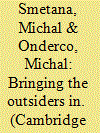

|
|
|
|
|
| Summary/Abstract |
In this article, we draw on insights from the interactionist perspective in sociology and international relations (IR) norm contestation literature to explore the relationship between deviance and normative change in international politics. In IR, this is still largely unexplored territory: we already know a great deal about how norms change, yet we know much less about the actual role norm violations play in this process. In order to address this gap, we conceptualize three types of normative contestation and affirmation that take place in connection with deviance (re)construction: (1) applicatory contestation and affirmation, reconstructing the meanings of international norms; (2) justificatory contestation and affirmation, challenging and reaffirming the legitimacy of international norms; and (3) hierarchical contestation and affirmation, contesting and reaffirming the relative value and importance of international norms. We discuss how, as a consequence of these dynamics, deviance-making produces both stability and change in the normative structure of world politics.
|
|
|
|
|
|
|
|
|
|
|
|
|
|
|
|
| 3 |
ID:
181694


|
|
|
|
|
| Summary/Abstract |
While many consider the threat posed by nuclear weapons to be greater than ever, the general public has largely lost interest in the issue of nuclear disarmament. To reinvigorate public support for a nuclear-weapons-free world, disarmament advocates have presented a range of arguments about the necessity of nuclear abolition. This article presents original data from a public-opinion survey of US citizens to examine the relative effectiveness of the most common pro-disarmament arguments. The study found that the least persuasive arguments had to do with the costs of maintaining a nuclear arsenal, the humanitarian impact of nuclear-weapons use, and the threats of nuclear terrorism and nuclear war. The most persuasive arguments related to nuclear-armed ‘rogue states’ and the possibility of nuclear accidents. Political stakeholders and civil-society actors might use these findings to more effectively frame their public messaging.
|
|
|
|
|
|
|
|
|
|
|
|
|
|
|
|
| 4 |
ID:
189005
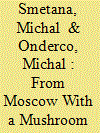

|
|
|
|
|
| Summary/Abstract |
This article presents findings of an original survey experiment on public attitudes toward nuclear use conducted on a representative sample of Russian citizens. We randomly assigned our participants to experimental treatments with vignettes describing a military conflict between Russia and NATO in the Baltics, where Moscow considered a limited nuclear “escalate-to-deescalate” strike to avert defeat. Our findings show that Russians are significantly more averse to nuclear strikes than to the corresponding use of conventional missiles. The participants disapproved similarly of a demonstrative nuclear explosion in an unpopulated area and of nuclear strikes in a more escalated scenario. We also found associations between the moral values of individuals and strike support corresponding to earlier studies in the United States. Finally, our participants reported similar concerns about both nuclear and conventional strikes, with the worry about civilian casualties and the suffering of victims at the top of the list across experimental treatments.
|
|
|
|
|
|
|
|
|
|
|
|
|
|
|
|
| 5 |
ID:
181642
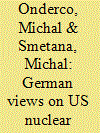

|
|
|
|
|
| Summary/Abstract |
Stationing of US nuclear weapons in Europe is a pillar of NATO deterrence. Despite their growing contestation, scholarly research on contemporary attitudes of both voters and political elites to the continued stationing of these weapons on their soil is lacking. We conducted original surveys of 2020 Germans and of 101 Bundestag members. Our results show scepticism about the military utility of US nuclear weapons in Germany, and aversion towards their use. At the same time, the results show a sizable support among both politicians and citizens for their removal from German territory as part of new nuclear arms control initiatives.
|
|
|
|
|
|
|
|
|
|
|
|
|
|
|
|
| 6 |
ID:
163168


|
|
|
|
|
| Summary/Abstract |
The Kashmir dispute between India and Pakistan remains at the core of one of the most intractable conflicts in modern history. This article provides a plausibility probe into the dynamics of this South Asian rivalry that is conceptually based on the dynamic understanding of “frozen conflicts” introduced in this special issue of Asia Europe Journal. We lay out the key features of the conflict vis-à-vis the redefined notion of frozen conflicts, situating the rivalry in the broader category of unresolved protracted conflicts with a looming threat of violence renewal. In turn, we examine the three transformational dynamics as they operate in this particular case: peaceful thawing, violent thawing, and conflict withering. We conclude that despite the ongoing developments within the conflict dynamics, the possibility of conflict transformation through any of the suggested pathways remains unlikely in the near future.
|
|
|
|
|
|
|
|
|
|
|
|
|
|
|
|
| 7 |
ID:
185993
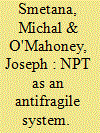

|
|
|
|
|
| Summary/Abstract |
We introduce “antifragility” as a conceptual framework to understand the impact of occasional violations of regime norms on the health of respective regimes. Contrary to the prevailing understanding of norm violation as a strictly negative phenomenon that leaves regimes damaged, we show that normative deviance is, under certain conditions, a stressor that helps predominantly antifragile systems learn, improve, and adapt to changes in both internal and external environments. We apply this conceptual framework to the case of the NPT regime and the prominent violations of its nonproliferation norms by India in the 1970s (as a “contestation from outside”) and Iraq in the 1990s (as a “contestation from within”). Our findings question the prevailing catastrophizing narrative about the strictly negative impact of norm violations on regime stability and contribute to contemporary scholarly debates about norm dynamics within the NPT.
|
|
|
|
|
|
|
|
|
|
|
|
|
|
|
|
| 8 |
ID:
162693
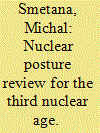

|
|
|
|
|
| Summary/Abstract |
In 1996, renowned U.S. defense expert Fred Iklé proposed that the nuclear drama of the past decades had entered its more volatile second act.1
1 Fred Charles Iklé, “The Second Coming of the Nuclear Age,” Foreign Affairs 75, no. 1 (1996).
View all notes
Soon after, the term “second nuclear age” began to be widely used among nuclear strategists.2
2 Keith B. Payne, Deterrence in the Second Nuclear Age (Lexington, KY: University Press of Kentucky, 1996); Colin S. Gray, The Second Nuclear Age (Boulder, CO: Lynne Rienner Publishers, 1999); Paul J. Bracken, Fire in The East: The Rise of Asian Military Power and the Second Nuclear Age (New York, NY: Harper Collins, 1999).
View all notes
Unlike the first age, marked by bipolar competition with the Soviet Union, the main challenge of the second age would come from belligerent regional powers equipped with weapons of mass destruction (WMDs) and ballistic missile technology. However, this era was not thought to last forever—for Professor Colin Gray, even in 1996, wrote the “second nuclear age can be seen as a period of interregnum between irregular cyclical surges in the kind of great power rivalry that organizes many strands in the course of strategic history.”
|
|
|
|
|
|
|
|
|
|
|
|
|
|
|
|
| 9 |
ID:
145269


|
|
|
|
|
| Summary/Abstract |
The quinquennial Nuclear Non-Proliferation Treaty (NPT) Review Conference represents a highly important event from the perspective of the EU Common Foreign and Security Policy (CFSP). Though not a party to the treaty itself, the EU has made a consistent effort since the 1990s to coordinate the positions of its member states and achieve higher visibility in the NPT review process. The aim of this article is to examine the role of the EU in the 2015 NPT Review Conference deliberations. Drawing on on-site observations, statements and in-depth research interviews, it argues that the recent institutional changes notwithstanding, the influence of the EU as a distinct actor in the NPT context remains very limited, and the EU's common position is in bigger disarray than ever before. This year's Review Conference demonstrated the widening rift between the member states, in particular in the area of nuclear disarmament and the related issues. The inability to maintain a coherent common position limits the EU ‘actorness’ and impedes its striving for relevance in the NPT forums. The dynamics outlined in this article further highlight the limits of the EU CFSP in security matters in which the national positions of individual member states are as divergent as in the case of nuclear disarmament.
|
|
|
|
|
|
|
|
|
|
|
|
|
|
|
|
| 10 |
ID:
168499


|
|
|
|
|
| Summary/Abstract |
This article deals with the concept of indirect coercion as a distinct type of coercive strategy involving three actors. We introduce a taxonomy of triangular strategies commonly employed in international politics: ‘hostage-taking’, ‘patron-client’ and ‘composite’ strategies. These three types of indirect coercion cover different ways in how the coercer draws the intermediary actor in the process of coercive bargaining to enhance his leverage over the target. For each type, we conduct a plausibility probe to study these dynamics on short empirical case studies. We argue that our conceptualisation of indirect coercion opens new avenues for research into deterrence and compellence in contemporary world politics.
|
|
|
|
|
|
|
|
|
|
|
|
|
|
|
|
|
|
|
|
|